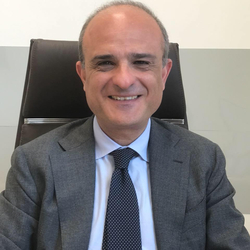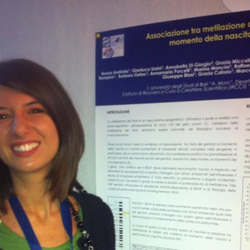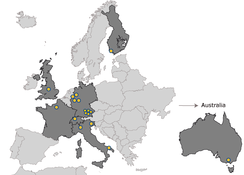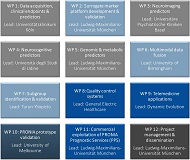 |
 |
Ph.D. Pergola GiulioAssistant Professor Coordinator of Neuroimaging and Data Mining Laboratory |
Ph.D. Antonucci LindaPostdoctoral fellow/ Involved in WP3 tasks |
|
|
|
Ph.D. Quarto TizianaPostdoctoral fellow/ Involved in WP3 tasks |
Dr. Andriola IleanaPsychiatrist/ Coordinator of clinical evaluations |
Ph.D. Romano Raffaella
Postdoctoral Fellow/ Neuropsychologist

Ph. D. Gelao Barbara
Postdoctoral fellow/ Neuropsychologist

Ph. D. Fazio Leonardo
Postoctoral fellow/ Involved in MRI data acquisition
The Psychiatric Unit at the University Hospital of Bari hosts the Group of Psychiatric Neuroscience, which includes a team of psychiatrists, psychologists, biologists, geneticists, brain imagers, and residents in psychiatry. The group is led by Professor Alessandro Bertolino and Prof. Giuseppe Blasi, and focuses its research on the investigation of the brain and of the biological mechanisms that predispose to the onset of brain disorders, including schizophrenia and bipolar disorder. To this aim, the Group of Psychiatric Neuroscience collects and analyzes clinical, environmental, neuropsychological, genetic, and brain imaging data. Imaging data are acquired using a high field MRI and an up-to-date equipment for Magnetoencephalography. Genetics and molecular biology studies are performed in a lab equipped for analysis of DNA and mRNA expression, proteomics, and cell cultures. All data acquired by the Psychiatric Neuroscience Group are integrated and analyzed, also with data mining procedures, for a general understanding of the mechanisms of illness, the development of new and personalized pharmacological treatments, as well as for the identification of risk factors for the onset of psychiatric disorders.
All data are acquired from people who voluntarily join the studies, including patients with schizophrenia, patients with bipolar disorder, healthy siblings of patients with these psychiatric disorders, and healthy individuals. Data acquired from healthy subjects are crucial for the understanding of the mechanisms of normal brain functioning.
The studies performed by the Psychiatric Neuroscience Group have been published in several papers published in the world's leading journals in the fields of psychiatry and neuroscience.
Specifically, the Psychiatric Neuroscience Group is composed of two laboratories:
1. The laboratory of Brain Imaging, Networks, and Data mining laboratory, directed by Doctor Giulio Pergola, which gathers researchers with diverse expertise in the field of imaging genetics, including biologists, biotechnologists, residents in Psychiatry, and psychologists. This ensemble of backgrounds reflects the high interdisciplinarity of the field of imaging genetics, with some researchers specialized in neuroimaging, and others working on computational genetics and biostatistics. We welcome students from all fields of neuroscience who are passionate about the inner workings of the human brain.
2. The Molecular Psychiatry and Genetics laboratory, directed by Doctor Antonio Rampino, whose goal is to study molecular mechanisms subtending major psychiatric diseases, such as schizophrenia and bipolar disorder. In particular, researchers here seek to understand the impact of genetic variation on the risk for these disorders, while looking at gene-by-environment interaction. Furthermore, they are interested in exploring the molecular mechanisms modulating response to pharmacological treatments, with the aim to identify potential targets of new drugs.
















